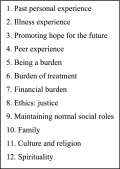Patient and health care professional decision-making to commence and withdraw from renal dialysis: a systematic review of qualitative research
- PMID: 25943310
- PMCID: PMC4491298
- DOI: 10.2215/CJN.11091114
Patient and health care professional decision-making to commence and withdraw from renal dialysis: a systematic review of qualitative research
Abstract
Background and objective: To ensure that decisions to start and stop dialysis in ESRD are shared, the factors that affect patients and health care professionals in making such decisions must be understood. This systematic review sought to explore how and why different factors mediate the choices about dialysis treatment.
Design, setting, participants, & measurements: MEDLINE, Embase, CINAHL, and PsychINFO were searched for qualitative studies of factors that affect patients' or health care professionals' decisions to commence or withdraw from dialysis. A thematic synthesis was conducted.
Results: Of 494 articles screened, 12 studies (conducted from 1985 to 2014) were included. These involved 206 patients (most receiving hemodialysis) and 64 health care professionals (age ranges: patients, 26-93 years; professionals, 26-61 years). For commencing dialysis, patients based their choice on "gut instinct," as well as deliberating over the effect of treatment on quality of life and survival. How individuals coped with decision-making was influential: Some tried to take control of the problem of progressive renal failure, whereas others focused on controlling their emotions. Health care professionals weighed biomedical factors and were led by an instinct to prolong life. Both patients and health care professionals described feeling powerless. With regard to dialysis withdrawal, only after prolonged periods on dialysis were the realities of life on dialysis fully appreciated and past choices questioned. By this stage, however, patients were physically dependent on treatment. As was seen with commencing dialysis, individuals coped with treatment withdrawal in a problem- or emotion-controlling way. Families struggled to differentiate between choosing versus allowing death. Health care teams avoided and queried discussions regarding dialysis withdrawal. Patients, however, missed the dialogue they experienced during predialysis education.
Conclusions: Decision-making in ESRD is complex and dynamic and evolves over time and toward death. The factors at work are multifaceted and operate differently for patients and health professionals. More training and research on open communication and shared decision-making are needed.
Keywords: CKD; dialysis; dialysis withholding; end-stage kidney disease; quality of life.
Copyright © 2015 by the American Society of Nephrology.
Figures
References
-
- Fresenius Medical Care: ESRD Patients in 2011: A Global Perspective, Bad Homburg, Germany, Fresenius Medical Care, 2012
-
- Hussain JA, Mooney A, Russon L: Comparison of survival analysis and palliative care involvement in patients aged over 70 years choosing conservative management or renal replacement therapy in advanced chronic kidney disease. Palliat Med 27: 829–839, 2013 - PubMed
-
- Murtagh FE, Marsh JE, Donohoe P, Ekbal NJ, Sheerin NS, Harris FE: Dialysis or not? A comparative survival study of patients over 75 years with chronic kidney disease stage 5. Nephrol Dial Transplant 22: 1955–1962, 2007 - PubMed
Publication types
MeSH terms
LinkOut - more resources
Full Text Sources
Medical
Research Materials
Miscellaneous



